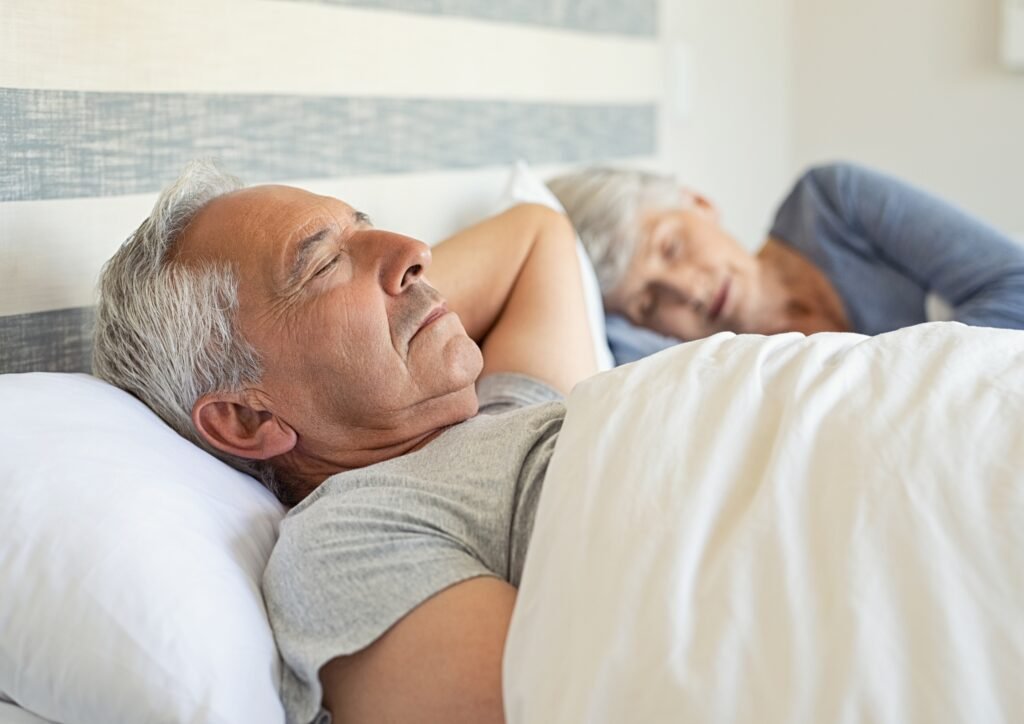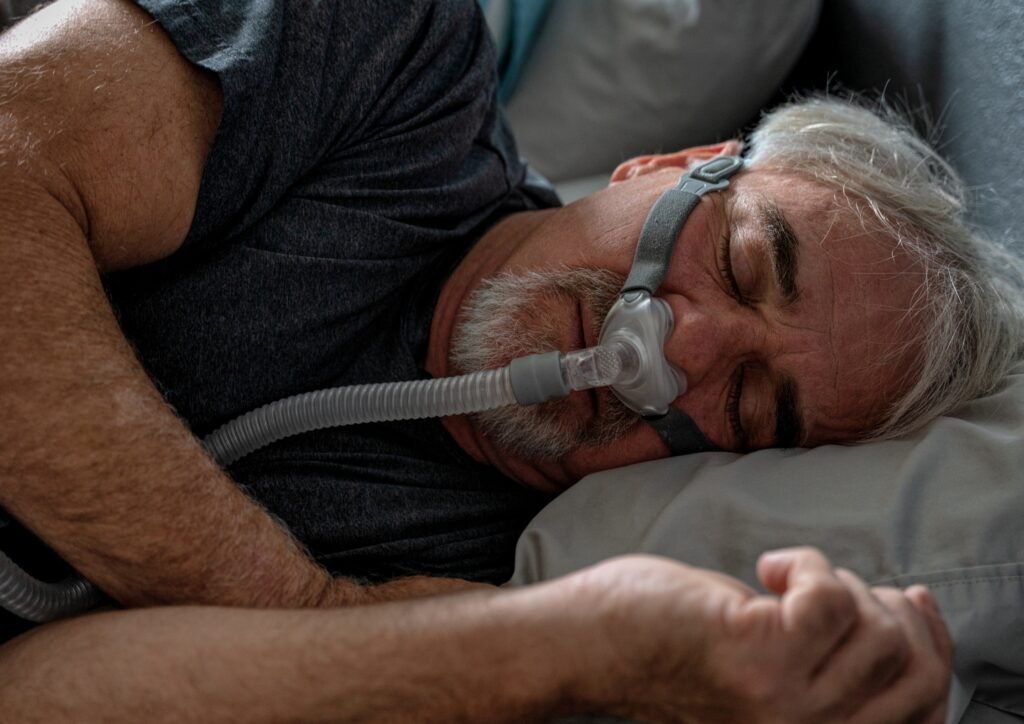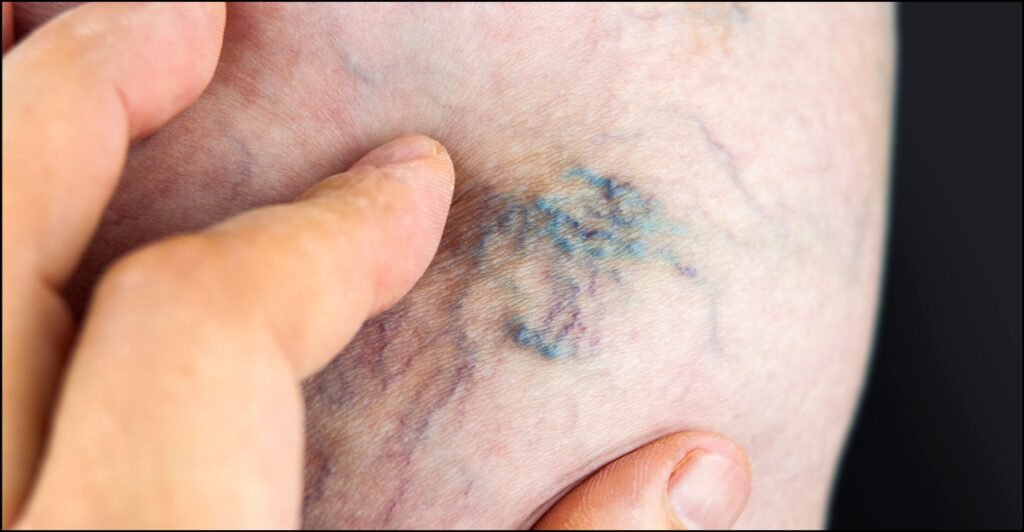The Surprising Truth About Senior Snoring: Medical Facts and Natural Solutions

Last Updated on June 27, 2025 by George
Are those nighttime sounds disrupting the peace in your household? Seniors’ snoring becomes increasingly common as we age, affecting up to 45% of men and 30% of women in their senior years. But snoring seniors face more than just a nocturnal nuisance — it can impact both sleep quality and overall health.
This comprehensive guide explores the causes of seniors’ snoring, effective home remedies backed by recent research, and when it’s time to seek professional help. From lifestyle adjustments to the latest treatment options, we’ll help snoring seniors navigate the path to quieter, more restful nights.
Whether you’re seeking solutions for yourself or supporting a partner who’s experiencing seniors’ snoring, understanding the condition is the first step toward better sleep and improved wellbeing in your golden years.
Understanding Seniors’ Snoring
Snoring seniors experience this condition when airflow through the mouth and nose is obstructed while sleeping, leading to vibrations in the throat tissues and the familiar snoring sound. As we mature, several factors make seniors’ snoring more prevalent and potentially more serious.
When seniors breathe during sleep, air should flow smoothly through the airways. However, when this passage narrows or becomes partially blocked, the surrounding tissues vibrate, creating that characteristic rumbling noise. For snoring seniors, these vibrations often become more pronounced due to natural age-related changes.
Prefer to listen rather than read?
What Causes Seniors’ Snoring?
- Age-Related Muscle Changes
- As we age, the muscles in our throat naturally become more relaxed. This means they’re more likely to collapse during sleep, which can block the airway and cause snoring. Have you noticed other muscles changing as you’ve aged? The same process affects your throat muscles, contributing to seniors’ snoring.
- Weight Considerations
- Carrying extra weight, especially around the neck area, can squeeze the airway and make it narrower. Recent research confirms that maintaining a healthy weight can significantly reduce snoring in seniors.
- Nasal Problems
- Issues like a stuffy nose or a deviated septum can block the nasal passages, forcing snoring seniors to breathe through their mouth and increasing the likelihood of snoring. Seasonal allergies or chronic sinus conditions, which are common in mature adults, can worsen these issues.
- Sleep Position
- Sleeping on your back can cause your tongue to fall backward into your throat, partially blocking the airway. This position often makes seniors’ snoring more pronounced, especially for those with already relaxed throat muscles.
- Alcohol and Medications
- Many seniors take medications that might relax throat muscles. Similarly, consuming alcohol before bedtime relaxes these muscles and increases the chance of snoring in seniors.
How Snoring Affects Seniors?
Seniors’ snoring is not just a minor annoyance; it can have serious effects on health and well-being:
Sleep Disruption
- Snoring seniors often don’t get a good night’s sleep. Even if you don’t fully wake up, your sleep can be disturbed, leaving you feeling tired during the day.
- Even if you don’t fully wake up, your sleep quality can be diminished, affecting your energy levels and cognitive function the following day.
- This can make it hard for snoring seniors to stay active and enjoy daily activities that maintain quality of life.
Health Risks
- Chronic seniors’ snoring can be a sign of obstructive sleep apnea (OSA), a serious condition where breathing repeatedly stops and starts during sleep.
- OSA can increase the risk of heart disease, stroke, and high blood pressure—all conditions that become more concerning for snoring seniors.
- It’s important for snoring seniors to get their condition checked out by a healthcare provider to rule out these serious health issues.
Relationship Strain
- If you share a bed, seniors’ snoring can disturb your partner’s sleep too, which can create tension in relationships.
- This often leads to partners of snoring seniors sleeping in separate rooms, which might affect intimacy and connection.
- Finding solutions for seniors’ snoring can help maintain harmony in relationships and ensure everyone gets the rest they need.
Understanding these effects helps snoring seniors realize the importance of finding solutions to their snoring problems. By addressing the causes and impacts of seniors’ snoring, they can improve their sleep and health and maintain better relationships.s. By addressing the causes and impacts of snoring, they can improve their sleep and health and maintain better relationships.

Home Remedies for Snoring in Seniors
While there are medical treatments available for severe cases of seniors’ snoring, many may find relief through simple lifestyle changes and home remedies. Here are effective approaches backed by recent research:
Lifestyle Changes Such as Weight Management
For snoring seniors, maintaining a healthy weight can make a big difference. Losing weight can help reduce the amount of fatty tissue in your throat, which can make the airway wider and reduce snoring.
- Eat plenty of fruits, vegetables, whole grains, and lean proteins to support weight management and reduce seniors’ snoring.
- Incorporate regular exercise appropriate for your fitness level — even moderate activities like walking can help maintain a healthy weight and potentially decrease seniors’ snoring.
- Remember, weight loss should be gradual and healthy — aim for sustainable changes rather than drastic diets.

Modifying Alcohol and Sedative Use
Alcohol and certain medications can relax the muscles in your throat, increasing the likelihood of seniors’ snoring. If you’ve noticed that your snoring worsens after consuming alcohol or taking specific medications, consider these tips:
- Avoid drinking alcohol at least four hours before bedtime to reduce seniors’ snoring.
- Talk to your healthcare provider about adjusting the timing of sedative medications that might contribute to snoring in seniors.
- If you suspect a medication is contributing to your seniors’ snoring, consult with your doctor before making any changes.
Sleep Position Adjustments
How you sleep can significantly impact seniors’ snoring. Sleeping on your back often makes snoring worse because gravity pulls your relaxed tongue and soft tissues toward the back of your throat.
- Try sleeping on your side instead of your back to keep your airway more open and reduce seniors’ snoring.
- Use body pillows to help maintain a side-sleeping position throughout the night, a simple trick for snoring seniors.
- Consider elevated head positions—raising the head of your bed by a few inches can help reduce seniors’ snoring by keeping airways more open.
Throat Exercises
Strengthening the muscles in your throat and mouth can help reduce seniors’ snoring. These exercises target the soft palate, tongue, and throat muscles that contribute to snoring when they relax too much during sleep.
- Practice pronouncing vowel sounds (a, e, i, o, u) out loud for a few minutes several times a day to strengthen muscles and reduce seniors’ snoring.
- Place the tip of your tongue behind your upper front teeth and slide it backward for 3 minutes a day, an effective exercise for snoring seniors.
- Close your mouth and purse your lips, hold for 30 seconds, and repeat several times to tone muscles that affect seniors’ snoring.
Nasal Breathing Exercises
Improving your nasal breathing can help reduce mouth breathing during sleep, which often contributes to seniors’ snoring. Here are some exercises to try:
- Alternate nostril breathing: Close one nostril with your finger and breathe in through the other, then switch sides—a beneficial practice for snoring seniors.
- Practice diaphragmatic breathing by placing one hand on your chest and the other on your abdomen, then breathe deeply so that your abdomen rises more than your chest.
- Regularly clearing your nasal passages with saline rinses can help keep airways open and reduce seniors’ snoring.
Using Proper Hydration
Staying well-hydrated can help reduce seniors’ snoring by keeping the secretions in your nose and soft palate more fluid. When you’re dehydrated, these secretions become stickier and can increase snoring.
- Aim to drink plenty of water throughout the day, not just before bed, to help prevent seniors’ snoring.
- Limit caffeine and alcohol, which can contribute to dehydration and worsen snoring in seniors.
- Use a humidifier in your bedroom to add moisture to the air, especially in dry climates or during winter, helping snoring seniors breathe more easily.
Bedtime Routines That Help
Establishing a consistent bedtime routine can improve overall sleep quality and potentially reduce seniors’ snoring. Here are some suggestions:
- Set regular sleep and wake times to help regulate your body’s internal clock and potentially decrease seniors’ snoring.
- Create a relaxing pre-sleep routine that might include reading, gentle stretching, or a warm bath—helpful practices for snoring seniors.
- Make sure your bedroom is dark, quiet, and at a comfortable temperature to promote better sleep and possibly reduce seniors’ snoring.
By incorporating these home remedies into your daily routine, snoring seniors may significantly reduce their snoring and improve both sleep quality and overall health. Remember that consistency is key — these approaches work best when practiced regularly over time.
However, if snoring persists despite trying these remedies, it is important to consult with a healthcare provider to rule out any underlying medical conditions that may be causing the snoring.

Anti-Snoring Devices and Solutions for Seniors
For snoring seniors whose condition persists despite lifestyle changes, various devices and solutions are available that have shown effectiveness in reducing or eliminating seniors’ snoring:
Humidifiers
Using a humidifier in the bedroom can keep the air moist, reducing nasal congestion and throat irritation that contribute to seniors’ snoring.
- Dry air can irritate the nasal passages and throat, making snoring worse for seniors.
- A humidifier adds moisture to the air, keeping these passages less irritated and potentially reducing seniors’ snoring.
- Models with built-in air purification can also help remove allergens that might contribute to nasal congestion and worsen snoring in seniors.
Elevating the Head
- Raising the head of the bed by a few inches can help keep airways open and reduce seniors’ snoring.
- Aim for an elevation of about 4-6 inches for optimal results in managing seniors’ snoring.
- This position helps prevent the tongue from falling back and blocking the airway in snoring seniors.
- Use a wedge pillow specifically designed for this purpose, or raise the head of the bed with blocks to help reduce seniors’ snoring.
Nasal Dilators
These simple devices help keep nasal passages open, promoting better airflow and potentially reducing seniors’ snoring.
- External nasal dilators are strips applied to the outside of the nose that gently pull open the nostrils, an easy solution for snoring seniors.
- Internal nasal dilators are inserted into the nostrils to hold them open from the inside, another option for seniors experiencing snoring.
- Both types can be particularly helpful for snoring seniors with nasal congestion or anatomical issues affecting the nasal passages.
Oral Appliances
Custom-fitted dental devices can reposition the jaw and tongue to keep airways open during sleep, effectively addressing seniors’ snoring.
- Mandibular advancement devices (MADs) move the lower jaw slightly forward, which helps keep the airway open for snoring seniors.
- Tongue retaining devices (TRDs) hold the tongue in a forward position to prevent it from blocking the airway, reducing seniors’ snoring.
- These devices should be fitted by a dental professional specializing in sleep medicine for optimal effectiveness and comfort for snoring seniors.

Medical Treatments for Snoring Seniors
When home remedies and over-the-counter solutions don’t provide sufficient relief, it might be time for snoring seniors to consider medical treatments:
Continuous Positive Airway Pressure (CPAP)
CPAP is a common treatment for obstructive sleep apnea, a condition often associated with seniors’ snoring. According to recent research, CPAP therapy is highly effective for snoring seniors with OSA.
- A CPAP machine delivers a steady stream of air through a mask worn during sleep by snoring seniors.
- This air pressure keeps the airway open, preventing both snoring and the breathing pauses characteristic of sleep apnea in seniors.
- Modern CPAP machines are quieter and more comfortable than older models, making them more acceptable for regular use by snoring seniors.
Oral Appliances
Custom-made oral appliances can be highly effective for treating seniors’ snoring and mild to moderate sleep apnea. Recent studies indicate they can be particularly beneficial for snoring seniors who cannot tolerate CPAP therapy.
- These devices are fitted by dental professionals specializing in sleep medicine for snoring seniors.
- They work by repositioning the jaw and tongue to maintain an open airway during sleep, reducing seniors’ snoring.
- Regular follow-up appointments ensure proper fit and effectiveness over time for snoring seniors.
Surgical Options
For some snoring seniors with anatomical issues contributing to their condition, surgical interventions might be recommended:
Uvulopalatopharyngoplasty (UPPP)
This surgery removes excess tissue from the throat to widen the airway and reduce vibration in snoring seniors.
- It’s typically considered when other treatments haven’t been effective for seniors’ snoring.
- Recovery can take several weeks, and results may vary among snoring seniors.
- This procedure is most effective for seniors’ snoring caused by specific anatomical issues in the soft palate area.
Radiofrequency Tissue Ablation
This minimally invasive procedure uses radiofrequency energy to shrink tissue in the soft palate, tongue, or nasal passages of snoring seniors.
- It can be performed in a doctor’s office under local anesthesia, making it convenient for snoring seniors.
- Multiple sessions might be needed for optimal results in reducing seniors’ snoring.
- The procedure causes minimal discomfort and has a quick recovery time, making it suitable for many snoring seniors.
Laser-Assisted Uvulopalatoplasty
This procedure uses a laser to shorten the uvula and make small cuts in the soft palate, potentially helping snoring seniors. It’s generally considered for simple seniors’ snoring rather than sleep apnea. It’s less invasive than UPPP and can be performed on an outpatient basis, beneficial for seniors with snoring issues.
Results may not be as long-lasting as other surgical options for seniors’ snoring.
Seeking Professional Help
When to See a Doctor? Snoring seniors should consider consulting a healthcare provider about their condition if:
- Loud and Chronic Snoring
- If your snoring is loud enough to wake your partner or even yourself, and it happens regularly, it’s a good idea to see a doctor.
- Daytime Sleepiness
- If you feel excessively tired during the day, it could be a sign that you’re not getting good quality sleep at night. This can be due to snoring and possible sleep apnea.
- Breathing Pauses During Sleep
- If your partner notices that you stop breathing for short periods during sleep, this is a sign of obstructive sleep apnea. It’s important to get this checked out by a doctor.

Diagnosis and Evaluation
When snoring seniors consult a healthcare provider about their condition, they might recommend:
- The results will help determine if seniors’ snoring is simple snoring or a symptom of sleep apnea.
- A sleep study to monitor breathing patterns, heart rate, and oxygen levels during sleep, helping to diagnose the cause of seniors’ snoring.
- This can be done at a sleep center or, in some cases, at home with portable monitoring devices, making it accessible for snoring seniors.
Comprehensive Treatment Plan
Based on the diagnosis, a healthcare provider can develop a personalized treatment plan for snoring seniors that might include:
- Regular follow-up appointments to monitor progress and adjust the treatment plan as needed for snoring seniors.
- Lifestyle modifications tailored to the specific needs and health status of snoring seniors.
- Appropriate medical devices or treatments based on the severity of seniors’ snoring and any underlying conditions.
Regular check-ups can help detect and manage conditions that may contribute to snoring in seniors. Seniors should discuss any sleep issues with their healthcare provider. Monitoring health conditions such as nasal problems, obesity, or sleep apnea can prevent snoring from becoming serious.
What Foods Can Help Improve Sleep?
Getting a good night’s sleep often begins with what you eat. Certain foods can naturally enhance your ability to drift off and stay asleep. Here’s a look at some that can help.
- Rich Sources of Tryptophan
- Tryptophan is an amino acid that plays a crucial role in the production of sleep-inducing chemicals. Foods like turkey, chicken, and eggs are packed with tryptophan. Incorporating these into your evening meal can set the stage for a restful night.
- Complex Carbohydrates
- Whole grains such as oatmeal, whole-grain bread, and quinoa can boost serotonin levels in your brain, promoting relaxation and drowsiness. These foods provide a gentle energy release that won’t interfere with sleep.
- Fruits Rich in Melatonin
- Fruits like cherries, grapes, and kiwi are high in melatonin, a hormone that regulates sleep-wake cycles. A pre-bedtime snack that includes these fruits can signal your body that it’s time to wind down.
- Nuts and Seeds
- Almonds, walnuts, and flaxseeds are excellent choices. Rich in magnesium and melatonin, they support muscle relaxation and the regulation of sleep rhythms.
- Herbal Teas
- Sip on a warm cup of chamomile or valerian root tea before bed. These herbal teas have natural calming effects that can help you relax and fall asleep faster.
- Dairy Products
- A glass of warm milk or a serving of yogurt contains not only tryptophan but also calcium, which enhances the brain’s use of tryptophan to manufacture sleep-promoting melatonin.
Incorporating these foods into your evening routine can make a noteworthy difference in your sleep quality. While diet is a key factor, remember that setting a comfortable sleep environment and maintaining consistent sleep schedules are also crucial for restful nights.
Final Thoughts
For seniors experiencing snoring, understanding the causes and seeking appropriate solutions is essential for maintaining good sleep quality and overall health. While seniors’ snoring becomes more common with age, it shouldn’t be ignored or accepted as an inevitable part of growing older.
Seniors’ snoring should not be ignored, as it can lead to serious health issues and affect quality of life. By implementing the strategies discussed in this article and seeking professional help when needed, snoring seniors can significantly reduce or eliminate their condition and enjoy more restful nights.
Remember, good sleep is crucial for healthy aging. Addressing seniors’ snoring issues can lead to improved sleep quality, better daytime functioning, and enhanced overall well-being in your senior years.
Are you currently dealing with seniors’ snoring, either as a snorer or as a partner of someone who snores? Have you tried any of these remedies, and if so, what has worked for you?
Frequently Asked Questions
- What is obstructive sleep apnea in seniors?
- Obstructive sleep apnea (OSA) is a serious sleep disorder where breathing repeatedly stops and starts during sleep. In snoring seniors, chronic snoring can be a sign of this condition, which occurs when throat muscles relax excessively and block the airway.
- OSA increases the risk of heart disease, stroke, and high blood pressure, making it particularly concerning for seniors who snore. It’s essential for snoring seniors to get evaluated by a healthcare provider if they experience loud snoring accompanied by gasping or choking sounds during sleep.
- What causes obstructive sleep apnea, and what are its risk factors for seniors?
- Several factors increase the risk of sleep apnea in snoring seniors. Age-related changes in muscle tone can affect the throat muscles, making them more likely to collapse during sleep. Weight gain, especially around the neck, can narrow the airway in seniors who snore.
- Certain medications commonly prescribed to seniors may relax throat muscles. Family history, smoking, alcohol use before bedtime, and nasal congestion also contribute to sleep apnea risk in snoring seniors. Men are more susceptible than women, though the risk for women increases after menopause.
- How can I tell if seniors’ snoring indicates sleep apnea?
- While not all seniors’ snoring indicates sleep apnea, certain signs suggest you should seek medical evaluation. Watch for loud, chronic snoring interrupted by silent pauses followed by gasping or choking sounds.
- Daytime symptoms like excessive sleepiness, morning headaches, difficulty concentrating, irritability, and memory problems can also indicate sleep apnea in snoring seniors. If you notice that a snoring senior stops breathing during sleep, this is a significant warning sign that requires prompt medical attention.
- How does sleep apnea affect memory and sleep in snoring seniors?
- Sleep apnea can significantly impact cognitive function in snoring seniors. The repeated oxygen drops and sleep fragmentation associated with sleep apnea can contribute to memory problems, difficulty concentrating, and increased risk of cognitive decline.
- Recent research suggests a potential link between untreated seniors’ snoring with sleep apnea and increased risk of developing dementia. Additionally, sleep apnea disrupts the natural sleep cycle, preventing restorative deep sleep and leading to daytime fatigue that can affect quality of life for snoring seniors.
- What treatments are available for sleep apnea in snoring seniors?
- Treatment options for sleep apnea in snoring seniors include CPAP (Continuous Positive Airway Pressure) therapy, which involves wearing a mask that delivers pressurized air to keep airways open during sleep. Oral appliances fitted by dental professionals can reposition the jaw and tongue to maintain airway patency in seniors who snore.
- Positional therapy helps snoring seniors avoid sleeping on their back. Weight management can be effective for those with weight-related sleep apnea. In some cases, surgical procedures may be recommended to remove or reduce tissues that cause airway obstruction in snoring seniors.
- How are memory and sleep connected for snoring seniors?
- The relationship between memory and sleep is bidirectional and particularly important for snoring seniors. Quality sleep is essential for memory consolidation—the process of transferring new information to long-term memory. During deep sleep and REM sleep, the brain processes and stores information learned throughout the day.
- Sleep disruptions, such as those caused by seniors’ snoring and sleep apnea, can interfere with these critical memory processes. Improving sleep quality through addressing seniors’ snoring can potentially enhance memory function and cognitive performance in older adults.
- What resources are available to help snoring seniors age well?
- Numerous resources exist to support healthy aging and sleep wellness for snoring seniors. The National Sleep Foundation provides information specific to seniors’ sleep needs and snoring issues. Many senior centers offer sleep education programs and support groups for seniors experiencing snoring. Medicare may cover sleep studies and certain treatments for diagnosed sleep disorders in snoring seniors.
- Local Area Agencies on Aging can connect seniors who snore with relevant services in their communities. Telehealth options now make it easier for snoring seniors to consult with sleep specialists remotely. Additionally, many hospitals and healthcare systems offer specialized geriatric sleep programs tailored to the unique needs of older adults with snoring concerns.
References
- American Academy of Sleep Medicine. (2024). “FDA authorizes eXciteOSA device for snoring and mild sleep apnea.”
- Harvard Health Publishing. (2025, February). “Do products that claim to stop snoring actually work?”
- National Institute on Aging. (2024). “Sleep and Older Adults.”
- Sleep Foundation. (2024, April). “How to Stop Snoring: 10 Ways to End Noisy Nights.”
- Cleveland Clinic. (2025, March). “Snoring: Causes, Remedies & Prevention.”
- Johns Hopkins Medicine. (2024, June). “Snoring.” https://www.hopkinsmedicine.org/health/conditions-and-diseases/snoring
- National Heart, Lung, and Blood Institute. (2024, March). “Does how loud you snore matter to your health?”
- ENT Health. (2025). “Treatment Options for Adults with Snoring.”
- American Medical Association. (2024, April). “What doctors wish patients knew about snoring.”
Disclaimer
The content provided on MySeniors.World is for informational purposes only and is not intended as either financial or medical advice. Always consult a qualified professional before making any investment or health-related decisions.
Posts may contain affiliate links, meaning we earn a commission – at no additional cost to you, if you click through and make a purchase. Your support helps us continue providing valuable content.





